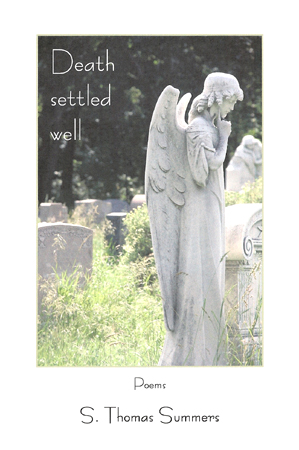
|
Jim Doss is co-editor of Loch Raven Review. He was born and
raised in the foothills of the Blue Ridge
Mountains. He has lived most of his life in the mid-Atlantic region with
the exception of several years in Arizona. His work has appeared in
Poetry East, Words-Myth, Poems Niedergasse, and other publications. A
graduate of the University of Virginia, he earns his living as a
software engineer, and lives with his wife and three children in
Maryland.
S. Thomas Summers is a teacher of English at Wayne Hills High School in Wayne, NJ. His poems have appeared in several print and electronic journals: MiPo, Rock and Sling, The Pedestal Magazine, The Iconoclast, etc. His chapbook "Death settled well" won Shadow Ink Publications 7th Bi-annual Chapbook Competition and was published in September 2006. "Death settled well" can be purchased at www.shadowpoetry.com or by contacting the author directly at [email protected]. Summers's blog address is www.poetry-is.blogspot.com. |
Winter 2006 Table of Contents - Vol. II, No. 4 |
|
|
Jim Doss
S. Thomas Summers,
Death settled well,
Shadows Ink Publications, ISBN 978-1-932447-76-7, 37 pages, 2006, $6.95. The subject matter of these poems ranges from naps to misplaced buzzards, baseball games to frogs caught by the lawnmower blades, pastoral scenes to deli dumpsters, fishing to searching for a lost dog, eating pears to drinking wine. Scenes abound that the typical literate suburbanite can relate to, and as the title and cover picture indicate death and ghosts appear as an undercurrent:
...A volume The poems that are most effective work on multiple levels, like the passages quoted above: past and future commingle, memory and the present, life and death. They transcend mere description, and the preciseness of Summers' language distills the poetic effect to the point every word has a purpose, enhances the overall impact. When Summers takes risks, lets his imagination run, while maintaining control over the language, he can produce some striking images such as in the poem Eight-Years-Old, which recounts a memorable visit to Yankee stadium with his father, and ends with the lines:
I want to crawl into daddy's
I'll take Snoopy's body, Overall, Death settled well is a book worth reading, and Summers is a serious, sincere, and talented artist who is able to turn the events of his day-to-day life into poetry.
© Jim Doss |
|
